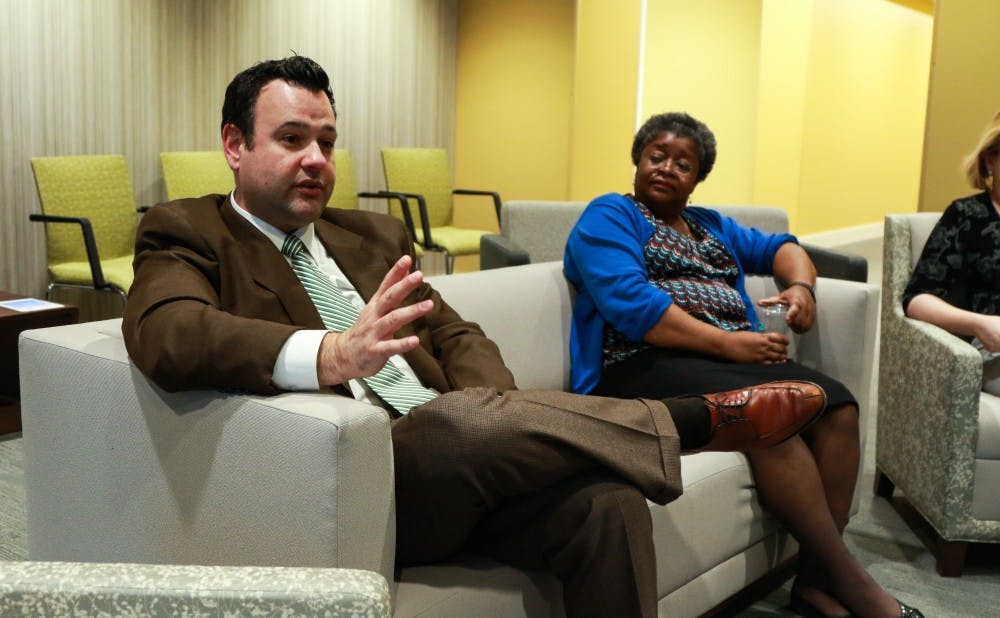Miguel Manna, a Raleigh-based immigration attorney, responded to concerns Wednesday about President Donald Trump's recent executive order on immigration.
In an event at the Duke Counseling and Psychological Services office, Manna—who works at Ogletree Law Firm—fielded questions along with Lois Yelverton, director of Duke Visa Services. In particular, Manna discussed precautions that international students should take when they travel to and from the United States.
“Bad writings make bad law, and the new executive order is not Shakespeare,” Manna said. “I don’t know what this ‘extreme vetting’ means—I just don’t know.”
The updated immigration order was released Monday and came after Trump's initial travel ban created havoc in airports across the county and was blocked by federal appeals courts.
Trump's new order clarifies that current green card holders are not barred from entry and that dual citizens will be allowed to enter the country—improvements on some of the uncertainty in the original ban.
“That significantly eases the sting of the ban, but I have concerns about whether that messaging is going to make it to the U.S. Customs and Border [Protection] officers at the ports of entry,” Manna said. “They seem to have been enthusiastically enforcing it in an agency that is not known for moving very fast.”
Students who are staying in the U.S. during summer break for fear of being denied re-entry are not entirely without cause, Manna noted.
He described the airport before passing through customs as a "legal no-man’s land." Manna said that until CBP admits a foreign national into the country, most of the normal legal rights to counsel and hearings are not applicable.
"The best possible guidance is for people to avoid that interaction," he said. "While that legal status when you arrive at the airport has always been there, what the travel ban has done is that it has unshackled the officers at the port of entry.”
As a result, Manna recommended that students flying in and out of the U.S. bring all their documentation, especially their signed I-20 form and visa stamp. Yelverton added that students can obtain up-to-date signatures on their I-20s by walking in to Duke Visa Services with their I-20, passport and I-94. New signatures are needed every year.
“Make sure you don’t give the officer a reason for additional scrutiny,” Manna said. “At the time when you’re getting off the plane and you’re about to go to customs, that is when you are most vulnerable.”
He also advised students to do "a conscious scrubbing of your social media interactions," even removing criticism of Trump on platforms that are public and easily accessible. Comments on social media alluding to violence, drugs and rape generally render individuals inadmissible, he explained.
“Don’t leave emails on public servers that you would reasonably think could be taken out of context,” Manna said. “Avoid comments that could lead the officer to think that you are something that you’re not.”
If an officer chooses to deny someone entry, the best thing that person can do is maintain his or her composure and be persistent but polite, he advised.
Manna also detailed how immigrants and foreign nationals should respond if detained and given a deportation order when in the U.S. Manna noted that persons with no status in the U.S. will be picked up, arrested and put into proceedings—but they do have the right to a hearing and counsel.
Within the U.S., an Immigrations and Customs Enforcement officer might attempt to persuade a person with no status to sign documents consenting to expedited removal from the country, Manna said. In this case, that person should instead request counsel.
In addition, students attending parties should take extra precautions to keep themselves on the right side of the law, he advised.
“If you are at a party or bar and drugs break out or a fight breaks out, just walk away, just leave,” Manna said. “It impacts you significantly differently than it does your U.S. colleagues. Because when cops raid a party, they arrest everybody, and then they figure out what to do.”
Manna added that international students should be especially wary of drinking and driving, as the repercussions are particularly severe.
“We have heard and seen reports where a person is charged with DUI, and a few weeks later, they get a letter from the State Department saying that their visa is cancelled,” Manna said.
Although this would not affect their status while in the U.S., they would have to reapply for a visa upon re-entering the U.S., at which point their criminal history would be taken into account.
Manna noted that he has been heartened by the support Duke and others have expressed for immigrants.
“The civic response—and this is not politics, this is everyday people—is surprisingly positive," he said. "There is a resistance within academia, among employers, and I see this everyday with my clients. Every single one of my clients wants to shield their foreign workers from harm, and I think that’s beautiful and that will blossom through these dark times.”
Get The Chronicle straight to your inbox
Signup for our weekly newsletter. Cancel at any time.

